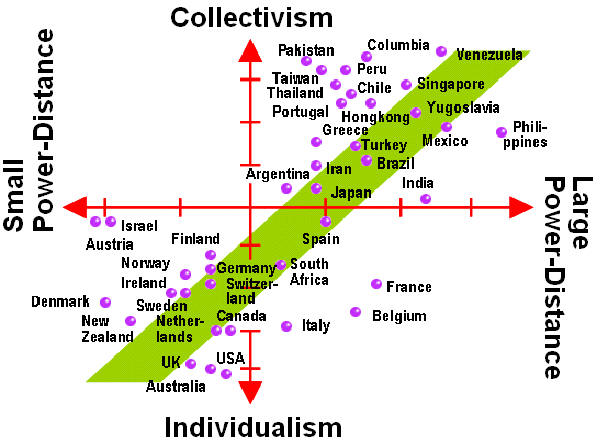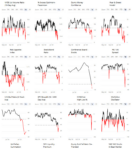The power distance between employer and employee enforces the importance of the leader, the entrepreneur. Moreover, the collectivite Asian society does not want unemployment, employees prefer to renounce to salary hikes in favor of the collective. These cultural reasons can qualify as drivers of the Japanese balance sheet recession.
For the main reasons for Japanese deflation can be found in current account surpluses and savings, central bank policies and global macro situation, but also from culture.Can’t the NAIRU applied to Japan?
Japan: unemployment rate 3.7% < NAIRU 4.3% (OECD). Nominal wage growth? <0. #gap
— Aurelija Augulyte (@auaurelija) February 24, 2014
General economics, current accounts and savings:
One reason was certainly the economic response to the asset bust in Japan that led to massive saving in the private sector and to the accumulation of huge current account surpluses opposed to a phase of strong (over-) spending in the U.S. and Europe. This accumulation of current account surpluses led to foreign money inflows, deflation and quite strong real GDP (per capita) growth. However, due to different reasons like fear of debt and of the “asset bubble”, the funds were used either to “repair” company balance sheets (Richard Koo) or remained largely uninvested. The yen appreciated.
Moreover, China and South Korea were big competitors for Japan. A certain degree of deflation was inherent in this competition because technology advanced and China was able to provide more and more cheap labor. A valid reason for Japanese deflation are technological improvements, that depress inflation via the hedonic effect.
Until 2007, the United States had strong local consumers that sustained the economy with purchases of local production and services.
Central bank policy and global macro:
The Bank of Japan and the government were not able to sustain the collapse of real estate prices, the Federal Reserve managed to do this in 2012/2013.
US (but also Japanese) real estate prices rose in 2013, because there were not many better global investments available. During the Japanese phase of deflation and weak asset prices until 2007, better global investments were available, namely the booms in the US, Emerging Markets and Southern Europe.
During certain periods, e.g. from 2005 to 2008, the total Japanese Balance of Payments was negative and the currency depreciated. Japanese funds left Japan despite the massive current account surplus, consequently deflationary pressures eased.
Cultural part:
Why were Japanese employees ready to renounce wage increases for more than a decade?
Why did Japan have wage deflation for more than a decade from 2000 to 2008, during a phase of strong global growth?
Via FOUR TIGERS AND THE DRAGON: VALUES DIFFERENCES, SIMILARITIES, AND CONSENSUS
Since the 1960s, the four “Tigers” (Hong Kong, Singapore, South Korea, and Taiwan) and the “Dragon” (China) have demonstrated their success in competing in world markets and have sustained high single to double digit economic growth for several decades (Fogel, 2005; Lee & McNulty, 2003). While economic commentators attribute this economic success to high savings and reinvestment rates as well as an export-oriented economic philosophy (see review by Sarel, 1996), cultural scholars suggest that the common root of East Asia’s thrift, diligence, and the willingness to put social progress ahead of individual wants lies in the region’s common Confucian heritage and values (e.g., Hicks & Redding, 1983; Hofstede & Bond, 1988; Kahn, 1979; Yu & Yang, 1994). This position is consistent with cultural divergence theorists who contend that cultural values systems are relatively stable reflections of the socio-historical heritage of a society (de Mooij, 1998; Inkeles, 1997).

The balance sheet recession and wage deflation might be just an expression of power distance, i.e. the respect of employees for company leaders and of the collectivist Japanese society?
This power distance argument might also be applied to Germany and Switzerland (even if not fully visible in Hofstede’s data).
On the other hand, it may explain why the individualist United States is not ending up in a Japanese-style balance sheet recession.
References:
Fogel, R.W. 2005. Reconsidering expectations of economic growth after World War II from the perspective of 2004. IMF Staff Papers, Vol. 52 Special Issues, Washington, DC: International Monetary Fund.
Hicks, G.L. & Redding, S.G. 1983: The story of the East Asian “economic miracle,” parts I and II, Euro-Asia Business Review, 2: (3 & 4)
Ho-Beng Chia, Carolyn P. Egri, et al. Lee FOUR TIGERS AND THE DRAGON: VALUES DIFFERENCES, SIMILARITIES, AND CONSENSUS, Online Link
Hofstede, G., et al: The Hofstede center, online link
Hofstede, G. & Bond, M.H. 1988 The Confucius connection: From cultural roots to economic growth. Organizational Dynamics, 16: 5-21.
Kahn, H. 1979. World economic development: 1979 and beyond. Boulder, CO: Westview.
Lee, H.C., & McNulty, M.P. 2003. East Asian’s dynamic development model and the Republic of Korea’s experiences. Policy Research Working Paper 2987. Washington D.C.: The World Bank.
Richard Koo, The Holy Grail of Macroeconomics: Lessons from Japan’s Great Recession, Wiley, ISBN: 0470823879, here our overview
Sarel, M. (1996) Growth in East Asia: What we can and what we cannot infer. Washington D.C.: International Monetary Fund.
Yu, A.B. & Yang, K.S. 1994. The nature of achievement motivation in collectivist societies. H.C. Triandis & U. Kim (Eds.) Individualism and collectivism: Theory, method, and applications. 239-266. Thousand Oaks, CA: Sage.





















